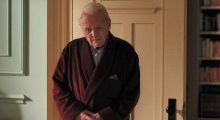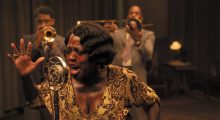6583 Results for “production”
-
A Question of Empathy: Viktor Kossakovsky on Gunda

Born in what was then Leningrad, U.S.S.R., Viktor Kossakovsky embarked on his journey to become one of the world’s most celebrated and elemental nonfiction filmmakers with a love of photography and a desire to explore the complexities of Russian history. After taking on various below-the-line roles at the Leningrad Studio of Documentaries, Kossakovsky directed his first feature, Losev, a black-and-white portrait of the elderly Russian philosopher Aleksei Fedorovich Losev. For his next black-and-white film, The Belovs, Kossakovsky turned inward, documenting a spirited but warring brother and his sister living on a farm in a western Russian village he had visited […]
by Erik Luers on Feb 10, 2021 -
The Doors of Our Mind: Director Florian Zeller on Memory, Mystery and The Father

The following interview was originally published in Filmmaker‘s Winter, 2021 print edition. Among the techniques used to remember is one dating back to the Ancient Greeks: the Memory Palace. Facts, people, life events are “placed” within the rooms of a building, preferably a real one the remembering person is very familiar with. To summon the memories, the person mentally strolls from room to room, allowing the individual locations within the building to trigger the images placed inside. The Memory Palace’s ability to associate memories with place is given a devastating twist in French director Florian Zeller’s debut picture, The Father, […]
by Scott Macaulay on Feb 10, 2021 -
The Places Left Behind

Gianfranco Rosi’s nonfiction films are unified by their (often solo shooter) director’s precise framing. With images so strongly composed, the films’ status as vérité documentation has raised, if not controversy, at least questions about judgment, overaestheticization and potentially trivializing endangered subjects. That’s especially true of Rosi’s latest, Notturno, filmed over three years across the borders of Iraq, Kurdistan, Syria and Lebanon. From the opening shot, capturing with geometrical precision a group of soldiers running laps, Notturno elides names, battles and geographical precision into a group portrait of grief echoing across territorial demarcations. A site for war-scarred children in therapy, a […]
by Robert Greene on Feb 10, 2021 -
Showing the Work: On Frederick Wiseman Subject Marty Walsh, Now the Biden Administration’s Secretary of Labor

If you live outside New England, and if you saw the movie, Frederick Wiseman’s City Hall (2020) was probably your introduction to Boston Mayor Marty Walsh, recently nominated to serve as Secretary of Labor in the Biden administration. And it’s a sustained introduction at that. Onscreen for about 45 of the film’s 272 minutes, Walsh is the living center of City Hall’s structure. Wiseman returns to his prepared remarks and public appearances like a buffer between less formal scenes of office talk and offsite labor, framing the mayor kind of like the loudspeaker in M*A*S*H (1970)—that is, if it had […]
by Jake Mulligan on Feb 10, 2021 -
Moving Through the Frame

Like The Searchers, Nomadland is bookended by a pair of doorways: on one side, the post-Baby Boom American Dream of domesticity and stability; on the other, the siren’s call of the wanderer, beckoning toward the unknown. In the film’s opening frame, Fern (Frances McDormand) stands in the doorway of a storage unit in Empire, Nevada. The Great Recession has swallowed the mining town whole; the 60-something widow takes one last glance at the remnants of her life, packed away in boxes, and climbs into her Ford Econoline van, headed toward the horizon. A year passes before Fern darkens another symbolic […]
by Matt Mulcahey on Feb 10, 2021 -
On the Beat

Chicago in 1927 was a fascinating, volatile place. The Great Migration, which saw an estimated six million African Americans leave the rural southern states for the urban north, was in full effect, and the Windy City was an important destination. By the mid 1920s, an estimated 100,000 Black people had settled in Chicago, making the city a hotbed for new cultural developments, especially in music—Chicago is widely regarded as the second stop in the evolution of jazz after New Orleans. The August Wilson play Ma Rainey’s Black Bottom tells one chapter of that evolution through a dramatic imagining of a single recording session […]
by Martin Johnson on Feb 10, 2021 -
Advance Team

“I suppose you want to talk about her process,” says producer Dan Janvey when I tell him I’d like to learn about the producing team’s work with Chloé Zhao on Nomadland. Well, yes, I say—but not because I and Filmmaker readers aren’t familiar with it. After all, Filmmaker has covered Zhao’s work since 2013, when she appeared on our 25 New Faces list before the production of her debut feature, Songs My Brothers Taught Me. We spoke with her for a feature interview about that film and for her follow-up, The Rider, our spring 2018 cover feature, watching her develop […]
by Scott Macaulay on Feb 10, 2021 -
Arizona Dreams of Justice
Imagine taking a film class in which, during week one, you learn activist filmmaking strategies from Pamela Yates and Paco de Onís of Skylight, a human rights media organization based in Brooklyn. In week two, you discuss participatory documentary and community collaboration with Concordia University professor and filmmaker Liz Miller. A little later in the course, you encounter Brenda Manuelito and Carmella Rodriguez, cofounders of nDigiDreams, a woman-owned and indigenous-focused consulting and training company based in Santa Fe, New Mexico. These are session descriptions of a graduate course titled “Advancing Human Rights Through Documentary Media,” developed and taught by Beverly Seckinger, a […]
by Holly Willis on Feb 10, 2021 -
Editor’s Letter
I spoke to a writer/director friend last week who lives in Los Angeles, where, at the time, coronavirus case numbers were still escalating. My friend hasn’t shot anything during the pandemic but has been using these months to work on a new script and develop a TV show. But in the last few weeks, this writer/director has been getting urgent calls from execs to board shows and features that are financed and ready to go. It’s a bit of a whiplash, my friend said—trying to remain cautious, to be cognizant that the pandemic is still ongoing, but while grappling with […]
by Scott Macaulay on Feb 10, 2021 -
Uprooted: Writer/Director Lee Isaac Chung on Minari

The following interview appears in Filmmaker‘s current Winter ’21 print edition and, a day after Minari won the Golden Globe for Best Foreign Language Film, appears online for all readers for the first time. “There’s a difference between something having happened or something being true,” says writer/director Lee Isaac Chung about the interplay between memory and creation that graces his fourth dramatic feature, Minari. Based on the filmmaker’s childhood—his family moved to the South, where his father hoped to develop a farm—Minari captures a time of familial change and uncertainty with seemingly effortless poetry and wonder. It’s the early 1980s […]
by Aaron Stewart-Ahn on Feb 10, 2021








